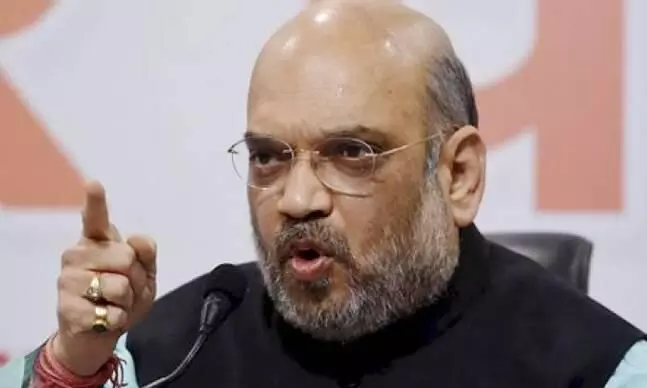
Ram Temple event stitched 500-yrs-old wound Babur caused: Shah
text_fieldsAhmedabad: Ayodhya's Ram Temple consecration "stitched a deep wound" caused by the Mughal ruler Babur 500 years ago, Union Home Minister Amit Shah claimed.
Speaking at the 'Punah Pran Pratishtha' ceremony at the newly-renovated Ramji temple in the Ranip area of Ahmedabad in Gujarat, Shah said, "Prime Minister Narendra Modi did remarkable work by performing `Pran Pratishtha' at the Ram temple in Ayodhya. Devotees of Lord Ram across the world have been waiting for this moment for the last 500 years. They were asking when Lord Ram would be shifted to a grand temple from that tent. This event has now stitched that deep wound which we got in our hearts during Babur's era."
Obliquely referring to the BJP coming to power in 2014, and portraying it as the beginning of a new era in Indian history, Shah claimed that previous governments prior to 2014 were afraid of respecting the country's culture, religion and languages.
"(Mughal emperor) Aurangzeb destroyed the Kashi Vishwanath temple. After all these years, it was PM Modi who rebuilt it and constructed a corridor there," the home minister said.
"Babur destroyed the Ram temple in Ayodhya. Now, a Ram temple has been built there, and PM Modi performed 'Pran Pratishtha' amid chants of Jai Shree Ram," he added using the customary refrain of the Hindutva school that the Babri masjid was built on the relics of the destroyed temple, a theory termed as without proof by the Supreme Court bench that granted the land of Ayodhya to the Hindu bodies.
During the consecration ceremony of Ram Temple on Monday, Bengaluru witnessed members of the Hindu faith crying out for the claiming of mosques in Kashi and Mathura, chanting 'Kashi Mathura baaki hai' (Kashi and Mathura remain).
In Varanasi, the Gyanvapi Mosque, located near the Kashi Vishwanath temple, has become a focal point of contention. Those aligned with Sangh and sympathizers, advocating for the mosque's demolition, claim it was constructed on the remnants of a temple.
Similarly, in Mathura, Hindu petitioners argue in court that the Shahi Idgah Mosque, built on Emperor Aurangzeb's orders in 1670, stands on the alleged birthplace of Lord Krishna, next to the Krishna Janmasthan temple. Last year, the Allahabad High Court consolidated all cases related to the Krishna Janmabhoomi-Idgah dispute, adding complexity to the broader narrative surrounding the consecration of the Ram temple.























